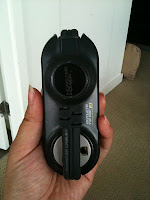Currently, there are almost one million millionaires in China (Previous blog on who are the China's wealthiest?). With all this new found money, where are they spending it? According to Business Insider, Chinese spent more money on luxury goods than Europe and the U.S. combined (click here for article). Last year emerging Asia accounted for around 50% of global luxury sales, most of which came from China.
 The Chinese are not only very practical people, but also they place high emphasis on culture of "face". It is no surprise these millionaires are buying up half of world's tangible luxury goods such as cars, jewelry, and fashion. These are all things that can give a person a lot of face. In terms of entertainment or service based purchases, these millionaires like spend money on travel, golf and yoga. Travel is their favourite method of relaxation. According to most recent Hurun Report, the most popular destinations include France, USA and Australia. Canada unfortunately didn't even make top 10! Tourism Canada has a lot of work to do. Annually, on average they make three international trips, spend approximately 190,000 RMB (31,000USD) on travel and 160,000 RMB (26,000USD) on shopping. Hurun wasn't able to clearly separate any stats between business and
leisure travel. The feedback from the millionaires often was that leisure travel is mixed in with business travel. From my personal experience I feel if the millionaire's family resides in China primarily, his/her family or leisure trips are often to domestic destinations such as Sanya, Hong Kong or Yunan.
The Chinese are not only very practical people, but also they place high emphasis on culture of "face". It is no surprise these millionaires are buying up half of world's tangible luxury goods such as cars, jewelry, and fashion. These are all things that can give a person a lot of face. In terms of entertainment or service based purchases, these millionaires like spend money on travel, golf and yoga. Travel is their favourite method of relaxation. According to most recent Hurun Report, the most popular destinations include France, USA and Australia. Canada unfortunately didn't even make top 10! Tourism Canada has a lot of work to do. Annually, on average they make three international trips, spend approximately 190,000 RMB (31,000USD) on travel and 160,000 RMB (26,000USD) on shopping. Hurun wasn't able to clearly separate any stats between business and
leisure travel. The feedback from the millionaires often was that leisure travel is mixed in with business travel. From my personal experience I feel if the millionaire's family resides in China primarily, his/her family or leisure trips are often to domestic destinations such as Sanya, Hong Kong or Yunan. The thing that surprised me the most was that 57% of these millionaires and billionaires book their own hotel and make their own itinerary through mostly travel websites rather then utilizing premium travel professionals. After some thought, I am actually not surprised. As I mentioned earlier the Chinese are very practical people, therefore it is important that the "product" that they receive has to fit the price. The major tangible products within the travel service industry are hotel and air. Everything else or what I like to call "creation of the ultimate experience" is a bit of a fuzzy area in terms of its value. It is not that the Chinese millionaires don’t appreciated it; they are still not yet very familiar with this concept and not sure of its value since it is not tangible. If they are unsure of the value of the service, it will be hard for them to trust others to provide them the service for the value.
The thing that surprised me the most was that 57% of these millionaires and billionaires book their own hotel and make their own itinerary through mostly travel websites rather then utilizing premium travel professionals. After some thought, I am actually not surprised. As I mentioned earlier the Chinese are very practical people, therefore it is important that the "product" that they receive has to fit the price. The major tangible products within the travel service industry are hotel and air. Everything else or what I like to call "creation of the ultimate experience" is a bit of a fuzzy area in terms of its value. It is not that the Chinese millionaires don’t appreciated it; they are still not yet very familiar with this concept and not sure of its value since it is not tangible. If they are unsure of the value of the service, it will be hard for them to trust others to provide them the service for the value.










